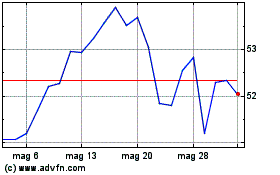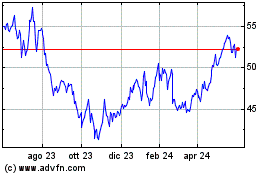By Nick Kostov and Stacy Meichtry
Advertising's digital upheaval took a heavy toll on WPP PLC as
the world's largest ad company Thursday logged its worst
performance since the financial crisis, triggering jitters among
investors across the sector.
On Thursday, WPP said net sales fell 0.9% on a like-for-like
basis last year, spooking investors who were expecting signs of
recovery after the company cut its forecast three times, predicting
a "broadly flat" 2017. The firm also said it is setting budgets for
2018 on the assumption of no growth in revenue and net sales.
WPP shares tumbled 14%, and the fallout quickly spread to rival
ad giants like Publicis Groupe SA, which fell 6%.
Digital disruption is leading Unilever PLC, Procter & Gamble
Co. and other consumer-goods giants that once splurged on ad
campaigns to rein in their spending. That is saddling ad firms with
their slowest revenue growth in a decade and pressuring agency
holding companies to revamp organizational structures that are out
of step with the digital age. Advertisers are demanding agencies
provide services that target consumers relentlessly over the
internet as well as coming up with traditional campaigns for print
and TV.
"We have to alter our model," WPP Chairman and Chief Executive
Martin Sorrell said in an interview.
Executives like Mr. Sorrell, 73, built the business model that
is now being tested. He corralled different Madison Avenue
agencies, such as J. Walter Thompson and Ogilvy & Mather, into
one large holding company while allowing those firms to run
independently. Agencies kept their own finances and creative
directors called the shots, instructing big clients on how to
revamp their brands.
Technological advances, however, have made it easier for clients
to cut out the agency middleman, purchasing online advertising
directly from platforms like Facebook Inc. and Google's parent
company, Alphabet Inc. Digital technology also eases automation in
some areas of the production process, allowing brands to reuse and
repurpose their advertising across different media. At the same
time, WPP's biggest clients are grappling with upstart rivals,
changing consumer tastes and the rise of e-commerce, putting
pressure on their marketing budgets.
Ad giants have responded by moving to align the different
agencies, cut costs and allow clients to work with advertising
staff that was previously siloed. WPP executives often refer to
this approach as "horizontality," while rival Publicis is trying to
unite its operations in a restructuring dubbed "The Power of One."
Omnicom has also been pushing to simplify areas like customer
relationship management, national brand advertising and public
relations.
This year alone, WPP has announced the merger of its public
relations firms Burson-Marsteller and Cohn & Wolfe and said
that it would consolidate five of its branding agencies into one.
In 2017, it combined its media agencies Maxus and MEC to form
Wavemaker; moved its digital agency Possible into its
customer-relationship marketing business Wunderman; and created WPP
Health & Wellness out of its four large health-care
agencies.
"We're clear on the destination. The changes that are taking
place are pushing us to do it faster," Mr. Sorrell said. "We have
to simplify and focus much more on a client and country level."
The question is whether the big ad companies can evolve fast
enough. P&G, long the biggest advertiser in the world, has said
that it is looking to cut an additional $400 million in agency and
production costs by 2021, having already saved around a combined
$750 million in recent year. Unilever, meanwhile, has also been
slashing agency fees and production costs, in part by reducing the
number of traditional ads it makes and bringing more of its
marketing work in-house.
Change has been particularly slow in the senior ranks of large
ad holding companies. There has been no talk at WPP of Mr. Sorrell
stepping down from the company he founded in 1986. His closest
rival, Omnicom, is run by 65-year-old Chief Executive John Wren,
who has been at the helm for more than two decades. Last year,
76-year-old Maurice Levy stepped aside as chief executive of
Publicis, the third-biggest ad company, after a drawn-out process
to choose Arthur Sadoun as his successor. Mr. Levy, however,
remains chairman of the firm.
Succession questions have dogged WPP for several years as
investors have demanded more clarity on the company's plans for
life beyond Mr. Sorrell, the only chief executive the company has
ever known.
Last June, Deborah Gilshan of Standard Life Investments called
on the WPP board to formally set a timetable for "an orderly
management succession."
"This remains the key governance risk to our long-term
investment in WPP, " she said.
As ad giants overhaul their operations -- investing in
artificial intelligence and engineering talent -- they also face
pressure to cut more costs to protect margins. WPP reported a 1.3%
decline in fourth-quarter organic net sales, a closely watched
metric in the industry that excludes currency effects and
acquisitions. Analysts expected a 0.7% rise.
In the fourth quarter, organic net sales were down 3.4% in North
America, 2.6% in Western Continental Europe and 3% in Asia Pacific.
The bright spot was the U.K., which rose 9.1%.
"2017 for us was not a pretty year," Mr. Sorrell said.
WPP's closest competitors have been facing similar headwinds.
Publicis posted organic growth of just 0.8% last year, while
Omnicom reported lackluster fourth-quarter revenue, blaming a
pullback by marketers on one-off projects and losses at some
independent-branded agencies. Mr. Wren, Omnicom's CEO, said he
expects the company to post softer organic growth this year
compared with 2017 due to technological change, shareholder
activism and new competitors.
WPP, Publicis and Omnicom have spent the past decade acquiring
assets to help them adapt to the online ad business. But many of
those investments ended up overlapping with their existing roster
of agencies, which had begun developing their own digital skills.
The duplication created confusion for clients seeking clarity about
how to operate in the digital ad world.
Mr. Sorrell said during WPP's earning presentation in London on
Thursday that the company is navigating the disruption by
partnering with Google, Facebook and Alibaba Group Holding Ltd.
Similarly, WPP has also been appointed by clients such like Nestlé
SA and HSBC Holdings PLC to work on digital transformation
projects, according to the company's investor presentation.
--Lara O'Reilly contributed to this article.
Write to Nick Kostov at Nick.Kostov@wsj.com and Stacy Meichtry
at stacy.meichtry@wsj.com
(END) Dow Jones Newswires
March 01, 2018 08:29 ET (13:29 GMT)
Copyright (c) 2018 Dow Jones & Company, Inc.
Grafico Azioni WPP (NYSE:WPP)
Storico
Da Giu 2024 a Lug 2024

Grafico Azioni WPP (NYSE:WPP)
Storico
Da Lug 2023 a Lug 2024
